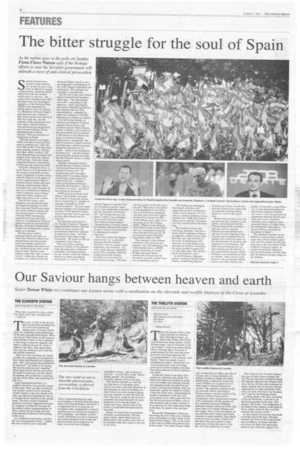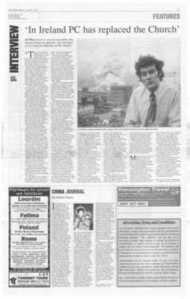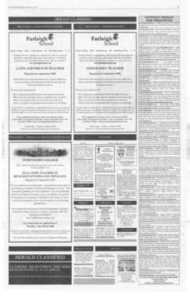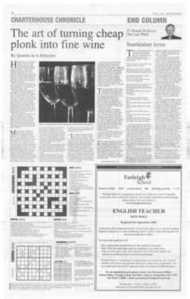Page 8, 7th March 2008
Page 8

Report an error
Noticed an error on this page?If you've noticed an error in this article please click here to report it.
Tags
Share
Related articles
The Spanish Bishops Have A Duty To Oppose Challenges To...
Why Spain Is No Longer Catholic
Spanish Link For Bishops
Vatican And Germany
Seeking Evidence
The bitter struggle for the soul of Spain
As the nation goes to the polls on Sunday Fiona Flores Watson asks if the bishops' efforts to oust the Socialist government will unleash a wave of anti-clerical persecution Spanish bishops have caused a huge political row in the run-up to elections in March by issuing a controversial statement which effectively tells the faithful which party to vote for the conservative Popular Party (PP). President Jose Luis Rodriguez Zapatero, of the Socialist Party (PSOE), has responded by telling them to stay out of politics. Relations between Church and state have now fallen to their lowest point since the Civil War. Not only that, but the majority of the population don't even agree with the bishops, who are becoming dangerously out of touch with their flock, threatening the Catholic Church's 500-year position of dominance in Spain.
That the Church is at loggerheads with the socialist government is nothing new: since the Civil War in the 1930s they have been sparring partners. During that short, bitter conflict, Leftwing Republicans ransacked and burned down churches, killing 5,000 priests, while the clergy supported Franco's nationalists by denouncing suspected rebels.
Over the subsequent 40 or so years Franco was responsible for the deaths of hundreds of thousands of Spanish. to some extent with the Church's tacit approval. It was a dark period of Spain's modern history which only now is being acknowledged, albeit reluctantly by some, through the new Law of Historical Memory, which condemns mass killings under the Franco regime and offers reparation to its victims.
The last few years, since Zapatero was elected just after the Madrid bombings in 2003, have seen the Church provoked into more outbursts against the government than ever before, with the PSOE introducing legislation for gay marriage, removal of compulsory religious tuition in schools and fast-track divorce. Polls have shown that 60 per cent of Spaniards support same-sex marriage.
But this latest conflict between Church and state, in which the Church is effectively attempting to oust the government, has rapidly turned into something deeper and more serious, threatening the unity of the Church itself. Indeed, some analysts claim that "theo-conservatives" within the Church are evidence of a rebirth of the old Francoist Right, which in turn has triggered a reawakening of the Left's deeply embedded anticlericalism. The outlook does not imply a smooth ride.
By the end of last year Church and government had reached a status quo "the atmosphere was calm", according to one observer until a pro-family rally held in Madrid last December reignited the row. The demonstration attended by either two million or 160,000, depending on whom you believe was led by the bishops of Valencia and Madrid, Cardinal Agustin Garcia-Gasco and Cardinal Antonio Maria Rouco Varela. A thinly veiled attack on the government and its policies in the run-up to the March elections, it featured Cardinal Garcia-Gasco saying that "the path of abortion, express divorce and ideologies aimed at manipulating the education of our youth... leads to the breakdown of democracy", and the bishops conveying the general message that the Catholic family is under strong attack.
Zapatero responded firmly, stating that the Catholic Church "had strayed from the fundamentals of democracy" by broadcasting such messages, adding that "in a regime based on freedoms, faith cannot be enforced by law". Another senior government politician called for the Church to "put its own house in order". and asked the bishops to-apologise.
PSOE general secretary Jose Blanco went further, accusing the Church of lying and saying that its leadership is "capable of causing a breakdown of the Christian family". He also stated that the bishops were hypocrites and that "if the Spanish ecclesiastical hierarchy want to get into politics, they should run for election".
The Spanish ambassador to the Vatican, Francisco Vazquez, agreed that the bishops "had led a Church attack against the government which was unheard in democratic times", and that the Church "had taken a step backwards". He made an official complaint to the Vatican.
This very public sparring reached a climax in late January, when the episcopal conference published a document setting out the criteria which the faithful should use when considering which party to vote for. They advised Spanish Catholics that not all political parties' manifestos "are compatible with faith and the demands of Christian life" and attacked the government's "unfair" gay marriage, divorce and education laws. They referred particularly to "the promotion of family based in marriage, and not other types of union which will destabilise it, darkening its unique character".
But what caused the biggest controversy was a statement implying that the faithful shouldn't vote for a party which negotiates with terrorists in other words, Basque separatist group ETA. Zapatero furiously countered that the Church shouldn't use terrorism for moral point-scoring. "The bish ops have gone too far this time," he said. "They have succumbed to the temptation to use terrorism in the electoral campaign, and they don't have the right to do this. If we haven't let [PP leader] Rajoy use it, then we're not going to let the bishops either.What is more, Bishop Juan Maria Urarte of San Sebastian was a mediator in negotiations between ETA and the PP government under President Jose Maria Aznar in 1999.
The response to the bishops' statement, both political and popular, was overwhelming. The Christian Socialists, a PSOE group which tries to "build bridges and open doors" between the Church and the Socialists, says the current situation is extremely serious. "The bishops are damaging the Church with this row," argues the group's coordinator, Carlos Garcia Andoin. "It's not only an external problem, but an internal one, within the Church. Many priests and lay Christians are very worried about the situation.
"The bishops can say that Christians shouldn't vote for a party which condones violence, or supports conflict of any kind. But they can't get involved in the issue of negotiating with terrorists. It is one thing to put forward the Catholic viewpoint, but quite another to enter politics and take sides. This should not be the Church's role."
In mid-February, Zapatero called a meeting with the Papal Nuncio, Archbishop Manuel Monteiro de Castro, to tell him that the Church must respect the government and stop telling people to vote for the opposition.
Before these recent events the government had sought to avoid public confrontation with the Church ahead of the elections, ignoring calls to separate Church and state definitively and end all state funding of the Church, and excluding from its agenda such explosive topics as the liberalisation of abortion and legalisation of euthanasia. And while the government has cut state funding for the Church, it has increased the amount which Catholics can contribute on their tax returns. After recent events, however, the government threatened to end state funding alto gether. As recently as late February it even announced plans to reform the religious freedom law and to "actively promote the separation between Church and state and avoid a situation whereby some religions enjoy more privileges, or suffer more discrimination, than others... to ensure liberty and religious pluralism in Spain".
The Spanish elections are on March 9, and at stake is much more than which political party will rule the country for the next four years; the very future of the Catholic Church in Spain, its social and political influence, and its relationship with the state and the Spanish people, hangs in the balance.
Editorial Comment: Page 11
blog comments powered by Disqus

















